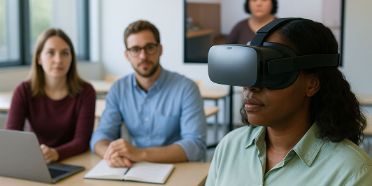Immersive learning in health care
Immersive learning against weight stigma: Using VR and AI, we are developing new teaching formats for non-discriminatory, empathetic communication in healthcare.
Factsheet
-
Schools involved
School of Health Professions
School of Social Work -
Institute(s)
Nutrition and Dietetics
Midwifery - Funding organisation BFH
- Duration (planned) 01.09.2025 - 31.05.2026
-
Head of project
Caroline Heuberger
Dr. Evelyne Aubry -
Project staff
Olha Faryma
Manuel Weber
Prof. Ninetta Scura -
Partner
afca AG, extended reality
Centre pluridisciplinaire neuchâtelois de l'obésité (cpno)
Université de Genève - Keywords Weight stigma, obesity, virtual reality, artificial intelligence, blended learning, healthcare professionals, non-discriminatory communication, patient-centeredness, empathy, future skills, experienti
Situation
Weight-related stigmatization is widespread in healthcare. Studies show that prejudice against people living with obesity not only impairs quality of life but also contributes to increased morbidity, mortality, and reduced effectiveness of therapeutic interventions. Healthcare professionals are particularly challenged to communicate respectfully and without discrimination. Nevertheless, research indicates that many professionals hold unconscious biases, and judgmental language, unspoken assumptions, or stereotypical attributions often mark consultations. At the same time, digital learning technologies open up new opportunities to critically reflect on such attitudes and promote empathetic competencies. AI-based training offers the opportunity to experience complex communication situations realistically and to make implicit stigma mechanisms visible.
Course of action
In the spring semester of 2026, a VR- and AI-supported blended learning unit will be implemented within the framework of the Certificate of Advanced Studies (CAS) in Obesity. The course is designed as a combination of online and face-to-face phases. In an e-learning module, participants acquire basic knowledge about weight stigma and communication, reflect on their own attitudes, and complete interactive exercises. A testimonial from an affected person makes the emotional dimension of stigmatization in interactions with healthcare professionals tangible. Participants then complete an AI-based VR training in which they conduct a consultation with a person living with obesity. Linguistic and structural expressions of stigma become immediately perceptible in this immersive experience.
Result
The course not only imparts specialist knowledge but also promotes the development of attitudes and communication skills. Participants recognize implicit biases, reflect on institutional dynamics, and practice concrete communication strategies for respectful, stigma-free counseling. The combination of theory, personal encounter, VR experience, and reflection creates a sustainable learning experience with emotional impact.
Looking ahead
In the long term, the project contributes to establishing stigma-free communication as a key competence in healthcare, thereby sustainably improving equity and quality of care.

